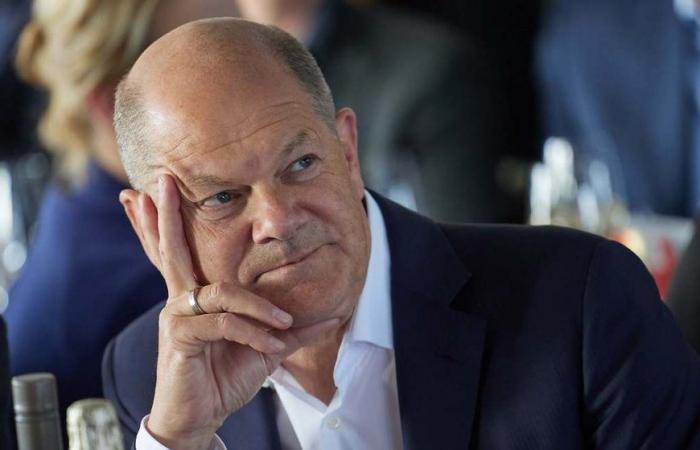The EU’s economic engine is not in its best shape. The German economy is beginning to lift its head after a difficult year, but it does so timidly. The German gross domestic product (GDP) has experienced an increase of 0.2% in the first quarter of the year and is gaining some air, after a recession in 2023 that translated into a contraction of 0.3% of GDP. Hurt by the impact of the energy crisis, the drop in domestic consumption and exports, the euro’s first economy is now the one that is growing the least among the large ones.
In its spring economic forecasts, the European Commission was cautious about the prospects for Germany. That contraction of last year will be followed by a stagnation in 2024, with a slight rebound in GDP of 0.1%. The figure is substantially below the 0.8% that Brussels predicts for the eurozone and the 1% expansion of the EU’s GDP.
“Domestic demand will slowly recover in 2024 and 2025, as real wage growth resumes,” analyzed by the European Commission. Brussels expects exports to remain weak in 2024 and slowly recover in 2025. Driven by domestic demand, GDP growth will increase moderately in 2025.
Two of the factors that have hampered the EU’s economic engine come together in exports and domestic demand, along with the energy crisis. It is true that the war in Ukraine and the consequent tension in relations between the EU and Moscow They have been a serious blow to Berlin, whose industry was highly dependent on Russian natural gas.
As the Kremlin cut off its supply to the community bloc, as a coercive measure, and the EU broke its dependencies on Russia, the German economic model weakened. Not in vain, his industrial structure pivots mainly on the chemical and automotive sector, both intense consumers of energy. Thus, the rise in electricity prices had a harsh and negative impact on the German economy.
Now energy prices are beginning to show signs of relief and the change in policy by the European Central Bank, with the recent rate cut in June, will allow Berlin to release ballast and catch its breath. “Inflation is expected to continue to decline, so real household incomes will continue to recover. All this combined with an improvement in consumer confidence points to private consumption returns to pre-pandemic levels in 2025″, estimated the community Executive.
Also enter the scene, at this point, the wage inflation recorded in Germany. In the first quarter of the year, salaries by agreement registered a rise of 6.3%, levels that are not very compatible with the ECB’s objective of bringing inflation to levels of 2% and which will condition monetary policy in the coming months. The figure far exceeds 3% in France, Italy or Spain and could be influenced by labor shortages.
Foreign trade
The German growth formula is strongly linked to foreign trade. If March brought some relief to Berlin with a 0.9% increase in exports, it was after the 2% drop recorded in February. And the fact is that the German economy support in foreign trade makes it especially sensitive to the geopolitical uncertainty caused by the conflicts in Ukraine and the Middle East.
“Trade is not expected to support growth in 2024 and will only have a minor contribution in 2025,” Brussels noted in its forecasts last May. The main reason that fencing was the loss of competitiveness in some sectors, mainly those that consume a lot of energy.
The growing trade tensions between China and the EU leave the German economy in a complex situation, considering that Berlin is Beijing’s trading partner most important in the Old Continent and vice versa. According to two data from the German Executive for 2022, bilateral trade between both countries was close to 300,000 million euros. German exports to the Asian giant amounted to 107 billion euros and Beijing’s exports to Germany rose to 192 billion euros.
Brussels has decided to stand up to Beijing for its trade practices and announced, this week, its intention to raise tariffs to 38.1% that applies to imports of Chinese electric vehicles. Although the rate varies depending on the manufacturer, Beijing did not take the news with much joy. The outcome that the dialogue with Beijing now takes could have great implications for Berlin.
In any case, Germany shows healthy finances for the coming years. Brussels estimates that the deficit will be around 1.5% and the debt will slightly exceed that 60% threshold, an enviable situation for other euro economies. “In 2024, the public deficit is expected to decrease to 1.6% of GDP, as a result of the gradual removal of measures to mitigate the impact of high energy prices,” the European Commission estimated. However, it warned that, with the debt brake back in force from 2024, the possibilities government spending “will be more limited in the coming years.
At the beginning of 2024, the German Finance Minister, Christian Lindner, wanted to send a message of calm at the World Economic Forum held in the Swiss town of Davos: “I know that some of you are thinking: ‘Germany is a sick man. ‘. Germany is not a sick man. After a very successful period since 2012 and these years of crisis, Germany is a tired man. After a short night. Low-growth expectations are, in part, a wake-up call. Now we will have a good cup of coffee, which involves structural reforms. And then we will continue to be successful financially.”
The extreme right, second force
The European elections last Sunday left Olaf Scholz’s traffic light government in a scenario of turbulent waters. It is not only that the CDU (which includes the president of the European Commission, Ursula von der Leyen) emerged as the leading political force, but, perhaps more relevant, the extreme right of the Alternative for Germany (AfD) It became the second most voted formation ahead of Scholz’s socialists. The German Chancellor ruled out emulating the steps of the French Executive and calling early elections. However, such a decision will depend largely on how much strength the coalition government, considerably damaged by public discontent, can now maintain. All this considering that none of the three forces that make it up have received the most votes in the elections.






